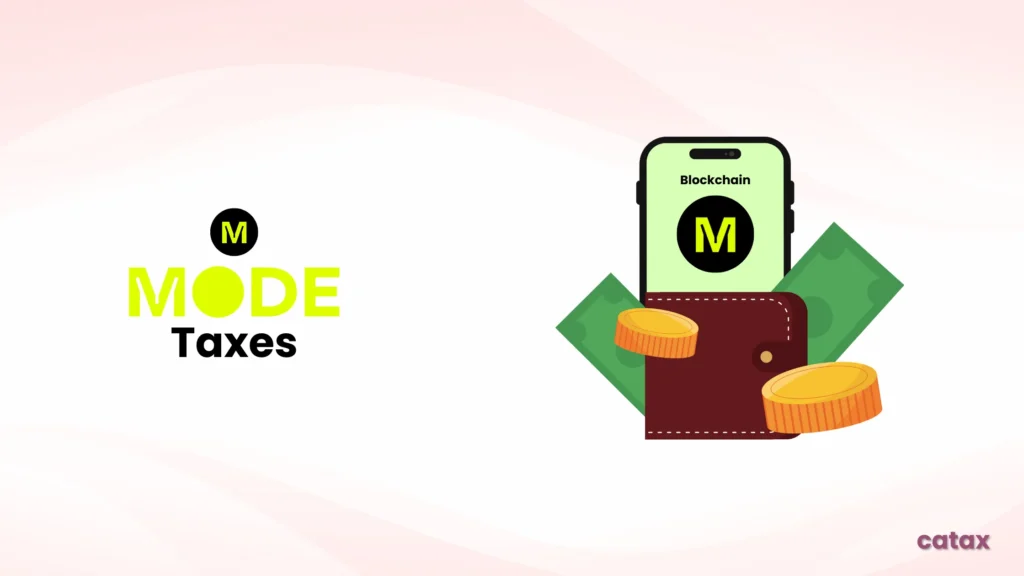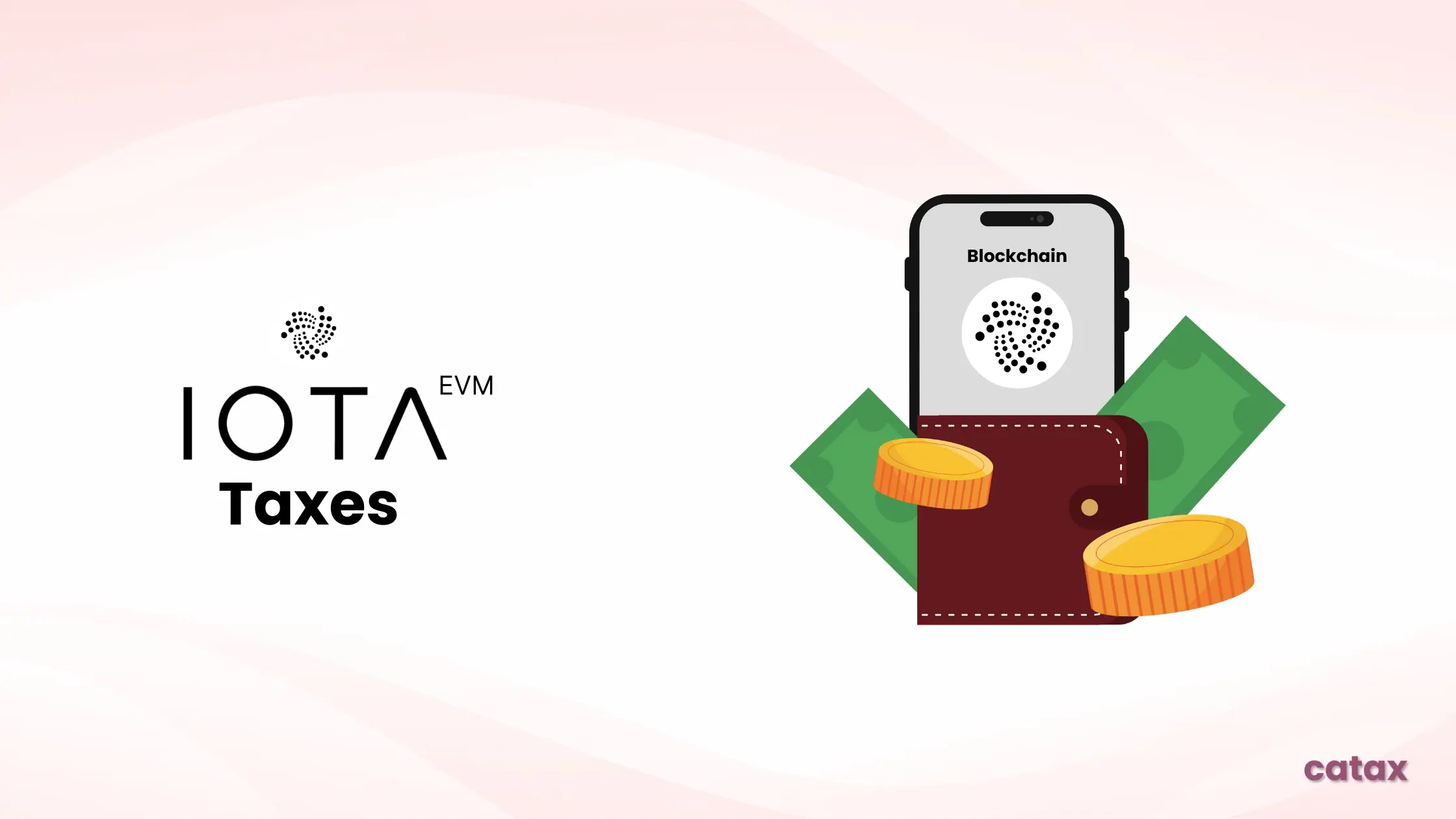Cryptocurrency tax rules vary by country, and IOTA EVM taxes transactions may be taxed under local laws. Whether you buy, sell, trade, or stake IOTA, understanding how tax authorities classify these activities helps you stay compliant and avoid penalties.
This guide simplifies IOTA EVM taxes so you can manage your tax obligations with ease.

How to Connect Your IOTA EVM Wallet to Catax
To track your IOTA EVM transactions and calculate taxes easily, follow these steps to connect your wallet to Catax:
- Open your IOTA EVM wallet or use a block explorer (such as MetaMask, Trust Wallet, Ledger, or any supported wallet).
- Copy your public wallet address from the wallet interface.
On Catax:
- Log in to your Catax account and select your country.
- Select Chain, then search for IOTA EVM Wallet.
- Paste your public wallet address and click Connect.
Once connected, Catax will automatically track your IOTA EVM transactions and simplify your crypto tax calculations.
Calculate My Taxes ➤Are IOTA EVM Transactions Taxable?
Yes, in most countries, IOTA EVM transactions are taxable. Tax authorities may classify IOTA as a capital asset, property, or income depending on how it’s used.
When Do You Have to Pay Taxes on IOTA EVM?
You may owe taxes when you:
- Sell IOTA for a profit – If you sell IOTA for more than what you paid, the gain is taxed as capital gains.
- Trade IOTA for another cryptocurrency – Swapping IOTA for tokens like ETH, BTC, or others may be considered a taxable event.
- Use IOTA to purchase goods or services – If IOTA has increased in value since you acquired it, spending it may trigger capital gains tax.
- Earn IOTA from staking or rewards – In many countries, staking rewards are taxed as income at the time you receive them.
- Get paid in IOTA – If you receive IOTA as payment for work or services, it’s typically taxed as income based on its fair market value at the time of receipt.
Since crypto tax rules differ by country, it’s important to check how IOTA EVM transactions are treated in your region to ensure compliance.
Can You Deduct Trading Fees and Other Costs?
Many IOTA EVM users ask whether trading fees, transaction costs, and security expenses can be deducted for tax purposes. This depends on your local tax laws.
Some countries allow deductions for:
- Trading fees incurred while buying or selling IOTA
- Network fees for transferring IOTA between wallets
Other countries may only allow:
- Deducting the original purchase cost of IOTA, while disallowing extra costs like exchange fees or gas fees.
To avoid reporting errors, review your country’s tax rules to determine what deductions you can claim.
How Is IOTA EVM Taxed Based on Holding Period?
The amount of tax you pay on IOTA profits may depend on how long you hold it before selling:
- Short-term holdings (less than a year) – Often taxed at standard income tax rates.
- Long-term holdings (more than a year) – Some countries offer reduced tax rates for long-term crypto holders.
- Flat-rate systems – A few jurisdictions apply a single tax rate regardless of how long the crypto is held.
Understanding how your country taxes holding periods can help you reduce your tax bill and plan better when managing your crypto portfolio.
You can also check out our Country-Specific Guide for Crypto in Your country. This guide provides insights on regulations, tax implications, and compliance measures breifly explained for each country.
How Is Staking Income Taxed?
Staking IOTA on the IOTA EVM network can be a great way to earn passive income, but how those rewards are taxed varies by country. Some tax authorities apply taxes when you receive staking rewards, while others only tax them when you sell or exchange the tokens. How Countries Tax Staking Rewards:
- Taxed as income – In some countries, staking rewards are treated like salary or regular income. This means you’re taxed based on the fair market value of the IOTA tokens at the time you receive them.
- Taxed as capital gains – Other jurisdictions only tax staking rewards once you sell or swap them. In this case, only the gain from selling the rewards is taxable.
If you stake IOTA, it’s essential to understand when taxes apply so you can plan ahead and stay compliant. In some places, staking rewards may be taxable even if you haven’t sold them.
Can You Claim IOTA Losses for Tax Benefits?
Not every IOTA EVM transaction is profitable. If you sell IOTA at a loss, you might be able to use those losses to reduce your overall tax burden—depending on your country’s crypto tax rules. How Countries Handle Crypto Losses:
- Loss offsets – Some tax systems let you use IOTA losses to reduce your taxable capital gains, so you only pay taxes on net gains.
- Loss carryforward – If you don’t have gains this year, some countries allow you to carry your losses into future tax years to offset upcoming profits.
- Limited or no deductions – A few countries don’t recognize crypto losses for tax relief, meaning you can’t use them to reduce your tax bill.
Keeping organized records of your IOTA transactions is key to claiming any eligible losses.
How to Stay Compliant with IOTA EVM Tax Rules
As crypto tax regulations evolve, compliance is more important than ever. Here’s how to stay on the right side of the law:
- Understand your country’s tax rules – Are your IOTA gains taxed as capital gains, income, or business revenue?
- Know what you can deduct – This includes trading fees, staking rewards, storage costs, and other expenses depending on your region’s tax laws.
- Keep detailed records – Track every IOTA transaction including buying, selling, staking, trading, and spending.
- Use Catax to automate crypto taxes – Catax helps you track all IOTA EVM transactions and generates tax reports in minutes.
- Consult a tax professional – If you’re unsure how IOTA is taxed in your country, get help from a certified expert to avoid surprises.


